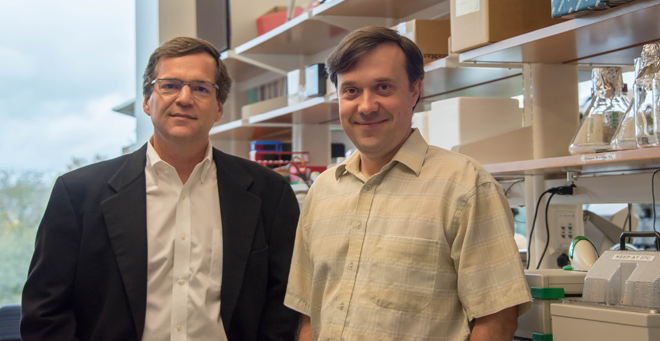 |
|
|
The RNA Society has named geneticist Erik Sontheimer, PhD, the 2018 Mid-Career Award winner and structural biologist Andrei Korostelev, PhD, the recipient of the 2018 Early Career Award. |
The pre-eminent international organization for RNA researchers is honoring two UMass Medical School scientists. The RNA Society has named structural biologist Andrei Korostelev, PhD, the recipient of the 2018 Early Career Award, and geneticist Erik Sontheimer, PhD, the 2018 Mid-Career Award winner. Both are faculty members in the UMMS RNA Therapeutics Institute.
“These awards recognize outstanding accomplishments by RNA scientists within their first 10 or 20 years as independent investigators,” said Phillip D. Zamore, PhD, Howard Hughes Medical Institute Investigator, the Gretchen Stone Cook Professor of Biomedical Sciences, and chair and professor of RNA therapeutics. “The selection committee deemed both Andrei’s and Erik’s science and their service to the RNA research community to be exemplary, which we, of course, already knew.”
Dr. Korostelev, associate professor of RNA therapeutics and biochemistry & molecular pharmacology, is recognized by the RNA Society for employing state-of-the-art cryo-electron microscopy technology to visualize the detailed movements, molecular rearrangements and dynamic atomic interactions of ribosome function that make protein synthesis so accurate.
“It’s an honor being recognized by your associates and peers in your field,” Korostelev said. “I was overwhelmed when I heard the news.”
The society cites Dr. Sontheimer, professor of RNA therapeutics, for his contributions to the understanding of molecular mechanisms of CRISPR-Cas RNA-guided DNA targeting, which has opened unprecedented opportunities for genome editing.
“It’s very gratifying to get the recognition for what I’ve been focused on my entire career,” said Sontheimer. He has been an active member of the RNA Society since its inception.
The Korostelev lab uses cryo-electron microscopy and other experimental techniques to understand molecular mechanisms of translation regulation on ribosomes in protein synthesis.
“The goal of our approach to visualize the dynamics of the ribosome is to answer some key questions about how the ribosome makes proteins,” Korostelev said. “We’re looking at many aspects of translation and translation regulation.”
Sontheimer is an early pioneer in the CRISPR gene editing field. His overarching, longstanding aim is to uncover and understand the roles of RNA molecules during gene expression, beginning with the seminal discovery that CRISPR targets DNA as well as RNA. Most recently, the lab has identified Cas9 inhibitors, so-called “anti-CRISPRs,” that could potentially be used as a means to control the activity of Cas9 enzymes.
“We were able to generate direct in vivo evidence that DNA targeting can be the functional output of CRISPR,” Sontheimer said. “Our 2008 paper first alerted the field that it could be tremendously useful for genome editing.”
Founded in 2009 and designated an academic department in 2016, the RNA Therapeutics Institute at UMass Medical School leverages the strong RNA biology and clinical research communities at UMMS to develop novel therapies for which RNA is the therapeutic target or modality. The RTI comprises a key component of the UMMS Advanced Therapeutics Cluster, which also includes the Neurotherapeutics Institute and the Gene Therapy Center.
Formed in 1993 to facilitate sharing and dissemination of experimental results and emerging concepts in ribonucleic acid research, the multidisciplinary RNA Society brings together evolutionary and structural biologists, biochemists, biomedical scientists, chemists, geneticists and virologists exploring questions of the structure and function of RNA and of ribonucleoprotein assemblies.
“It’s especially gratifying to be sharing RNA Society recognition with a UMass colleague because the RTI in particular and UMMS in general are hotbeds of RNA research,” said Sontheimer. “It’s good to know the rest of the world sees us that way.”
“An international organization selecting both awardees from one institution makes a statement about the stature and reputation of the RTI,” Korostelev said.
The researchers will accept their awards at the RNA Society’s 2018 annual meeting to be held next spring in Berkeley, Calif., where they will deliver talks on their award-winning research programs.
Related stories on UMassMedNow:
Breakthrough technology enables UMass Medical School scientists to view gene translation in action
UMMS scientists co-discover first ‘off-switches’ for CRISPR/Cas9 gene editing
UMMS structural biologist wins distinguished young scholar award
Sassetti, Sontheimer elected fellows of the American Academy of Microbiology